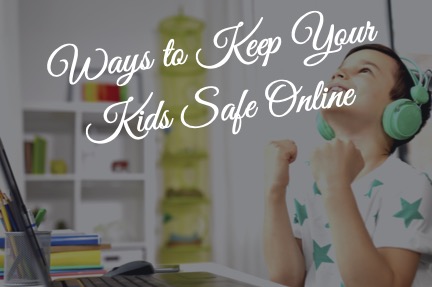
It is summer, and many of us have kids at home, perusing the web. As parents, we do everything that we possibly can to keep our kids safe and healthy. We teach them how to remain safe, from wearing a bicycle helmet to looking both ways before crossing a street. How do we keep them safe online?
When it comes to our kid’s safety, often overlooked is their safety online. How do we keep them safe from inappropriate content, bullies, and malware online? We are going to cover some cyber safety steps you may use to help keep your kids safe online (check out a recent article of ours on “How To Keep Yourself Secure Online’).
Talk with your kids about what they are doing online
The first step is awareness; awareness of what your kids are using the internet for as well as keeping them aware of ways to stay safe online. Keeping an open communication channel with them is the best practice. You need to start this as soon as your kids start using the internet, this way you will not face any “barriers of entry” down the road (they may still argue with you about it, they’re kids after all).
Talk with your kids about what they are using the internet for, what are they watching, and who they are talking to. Ask your kids about what sites they visit and what apps they are using. Talk with your child about what you believe is appropriate for them to be doing on the internet; remind them that this may be different than other parents and their friends (this is an important step!).
Teach them that the internet is not private and how they treat others and represent themselves online will always be there for others to see. How they treat others and represent themselves online will make up their online reputation and follow them wherever they go.
Learn, know, and use parental controls
Be proactive here and set up parental controls on the devices your kids are using. The parental control can filter out and block inappropriate content and limit access to certain websites and apps. Even innocent searches online may sometimes provide inappropriate results, this is where the filters step in, blocking inappropriate content. Limiting access to particular sites and apps your kids like to use may help to keep them from being distracted during schoolwork or from spending too much time on the device.
Parents mustn’t solely rely on parental controls. Parental controls, albeit good, are not perfect, allowing inappropriate content to slip through at times. Kids may also begin to feel that the controls are an overstep and that they should be allowed access to more online. This is where open communications are important. Your kids can let you know when something slips through, and you all may have an open discussion when kids feel the controls are too restrictive.
Keep displays where you can see
As we mentioned above, parental controls and filters are not perfect and inappropriate content may slip through the cracks from time to time. Being able to see what your kids are viewing will help you quickly get the inappropriate content off the display. This will also allow to you keep an eye on what your kids are doing online, making sure they’re engaging in safe activities and not communicating with those they shouldn’t be.
You may want to check the browser histories from time to time just to make sure they are not visiting any inappropriate websites. As they age, your kids will learn how to clear the browser histories, so again, an open communication channel is wildly important.
Teach your kids what is safe and unsafe to share to protect privacy
When your kids begin to use social media regularly, you need to make them aware of what is both safe and unsafe to share. When you post on social media, that content becomes public. You want to make sure your kids are not sharing personal information and images. Encourage your kids to check with you before posting anything or asking themselves if this is something they should be posting.
Keep your location private
Just about every app, network, and device these days has a geo-tagging feature the makes your location public. The fear here is that it can lead someone directly to you. Turn the geo-tagging feature off before your kids can use that app, network, and device to keep their location private.
Make your kids aware of Malware
You will want a good anti-virus and malware program installed and updated on the device before your kids using it. The best method to prevent your kids from the danger of malware is to keep them aware of it. Malware can infect your device through a variety of ways; infected websites, music and movie file-sharing, bad software, clickable links, online video games, and more.
Talk to your kids on ways malware may infect your computer, what to look out for, do not click on links they are unaware of, and let them know about current malware trends; we know this can be boring for them, and you’ll need to stay current to keep them aware as well. You do not need to go into the technical details on the different malware tends, just make them aware of it.
Takeaways
There are many ways for you to help keep your kids safe online, but an effective and open communication channel with your kids is key to them all. Be proactive by learning the parental controls available to you and set them up before your kids start using the internet, apps, and devices. Let them know there are parental controls on there to help keep them safe. Parental controls are not 100% effective to keep displays in view and check the browsing histories from time to time. Keep your kids aware of malware and viruses.
This is not a fully comprehensive list of ways to keep your kids safe online. What are some other ways you are keeping your kids safe online? Share with us in the comments below.
